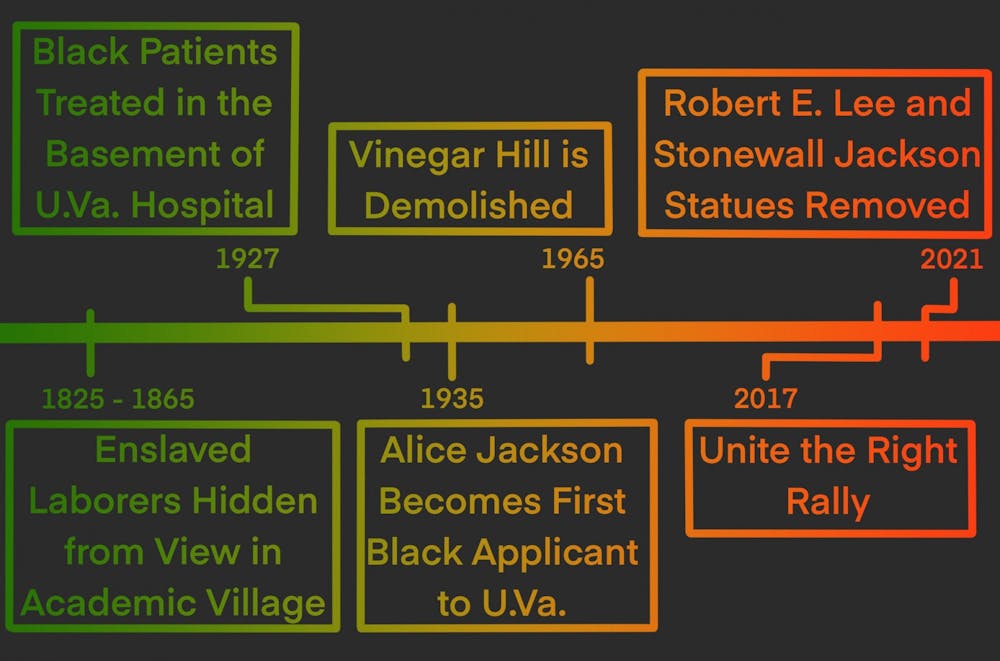Amidst virtual medical school classes and country-wide protests for racial equality, in spring 2020 fourth-year Medicine student Nadine Michel created a virtual timeline to tell the history of the University from a Black perspective.
Raised in Columbia, Md., Michel came to Charlottesville in 2014 to pursue both a medical degree and doctorate in neuroscience. Her passion for mental health and community advocacy began at a young age — growing up, Michel recalled visiting members of her father’s congregation who suffered from untreated mental illnesses.
After witnessing social stigma prevent discussion on mental illness, the importance of community dialogue was front and center in Michel’s mind. In spring 2020, Michel, inspired by a course she was taking on black physicians’ history — as well as the racial protests around the country — took a step back and noticed the lack of dialogue about racial history in Charlottesville. To address this, she decided to create a user-friendly online website that highlights events surrounding the Black community at the University from 1817 to the present.
Using research from the President’s Commission on the Age of Segregation and the President’s Commission on Slavery and the University, Michel organized each historic moment into five categories — Significant Leaders, Architecture, Historical Events, Eugenics at the University and Pivotal Legislation. The sliding timeline spans the University’s founding in 1817 to the removal of the Robert E. Lee and Thomas “Stonewall” Jackson statues in July.
Michel said she hopes that her project will be used by students and community members alike to better understand Black history at the University and to provoke constructive dialogue. This dialogue, Michel said, is essential to the growth of the entire student body — and medical students in particular.
“This needs to be part of the curriculum for medical students because we deal with patients that have this history that's real to them,” Michel said. “It affects how they perceive us and my power to give them care.”
Other graduate programs at the University are now considering integrating the timeline into their curriculums, Michel said. The Biomedical Sciences Graduate Program filmed a video in August interviewing Michel on her timeline.
Janet Cross, associate dean of graduate and medical scientist programs, said the goal of the video is to give prospective students the chance to see students' responses in wake of the deadly “Unite the Right” rally and the events of Aug. 11 and 12, 2017, when hundreds of white supremacists came to Charlottesville to protest the removal of the Robert E. Lee statue on the downtown mall. Jurors sided with plaintiffs on four out of six claims in the trial for the rally organizers Nov. 23.
“I can talk about that from my perspective, but it's really our students' perspectives that matters to those people who are considering joining us here and our graduate programs,” Cross said. “I think that it is a fantastic tool for awareness. And so it will be distributed to our students for them to use as they see fit.”
The timeline is designed to be accessible to all and is also making its way to the undergraduate level. Asst. History Professor Justene Hill Edwards said she plans to use the timeline next semester in one of her courses on Pre-Civil War African American History.
“In the history department we've been thinking a lot about how we introduce courses and different kinds of methodological pathways that we can use to kind of attract students to start thinking about history,” Hill Edwards said. “Living in Charlottesville and being at U.Va. is a unique experience, and in many ways, really understanding the history of slavery here is a part of that experience as well.”
Michel is one of many graduate students at the University working on increasing the dialogue surrounding diversity and the University experience, Cross said. On Oct. 21 the Graduate Recruitment Initiative Team — which focuses on diversity, equity and inclusion across graduate programs — met to discuss action they could take for this semester.
“We have a large and committed group of students who are passionately interested in the areas of diversity, equity and inclusion, particularly in the STEM fields, where it remains a huge challenge,” Cross said. “It was a particularly warming morning for me to spend with our student leaders and hear their perspectives.”
Emphasis on Black history has been a topic of conversation in the U.Va. Health system in the last few years. Within the hospital, several wings previously dedicated to proponents of eugenics have been renamed. This includes the Barringer Wing which was renamed the Collins Wing in Aug. 2019 in honor of University alumnus Francis S. Collins.
Michel said addressing this history is crucial as many living members of the Charlottesville community have experienced segregation in the University hospital and remember being treated in the basement of the School of Law.
With work yet to be done, Michel remains optimistic about the recent progress of the University.
“I think things are heading in a positive direction in terms of how the University is grappling with its own history and dealing with it,” Michel said. “Obviously, I would love for all the changes to happen immediately and for it to happen faster, but I think we're moving overall in a better direction.”







